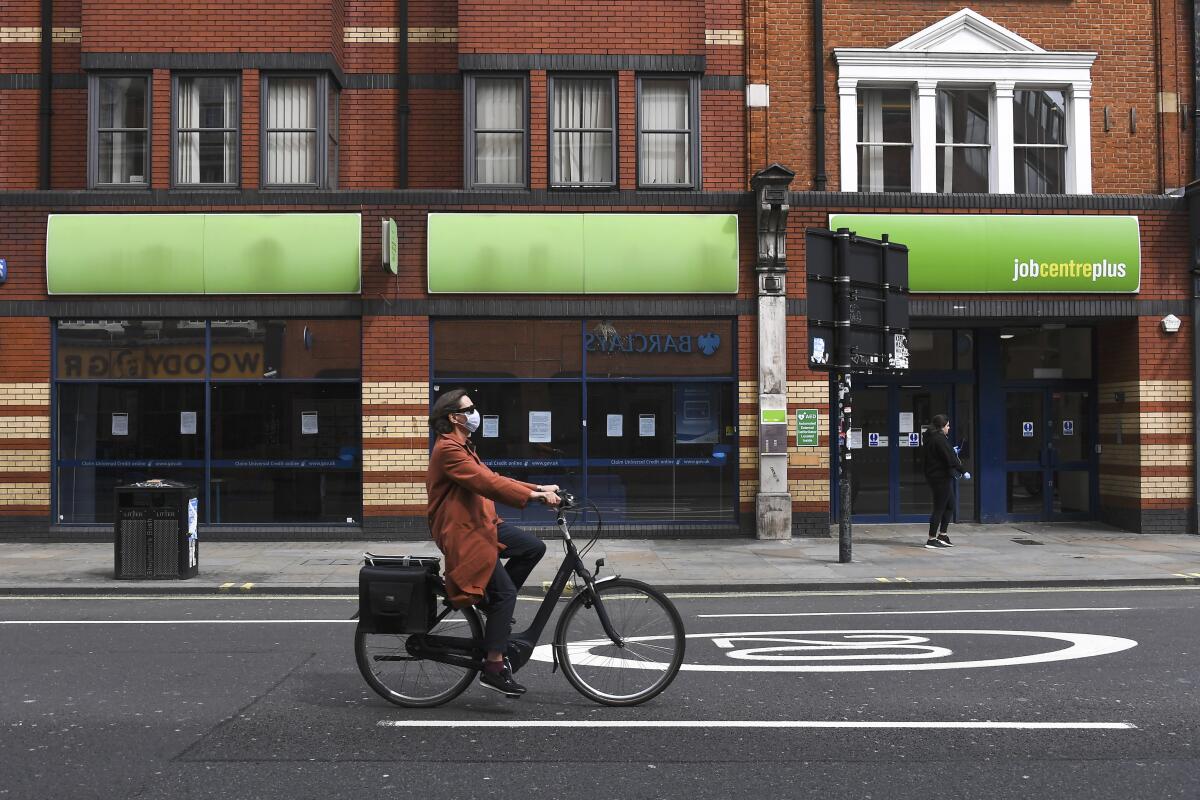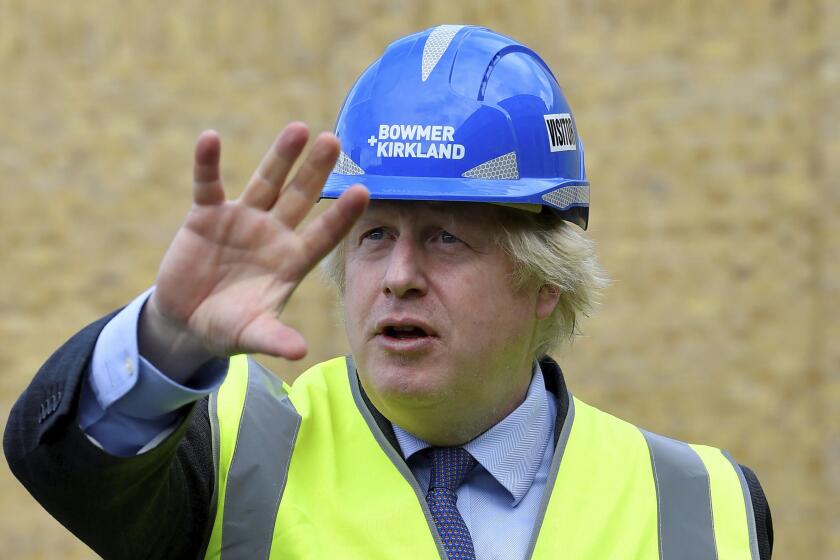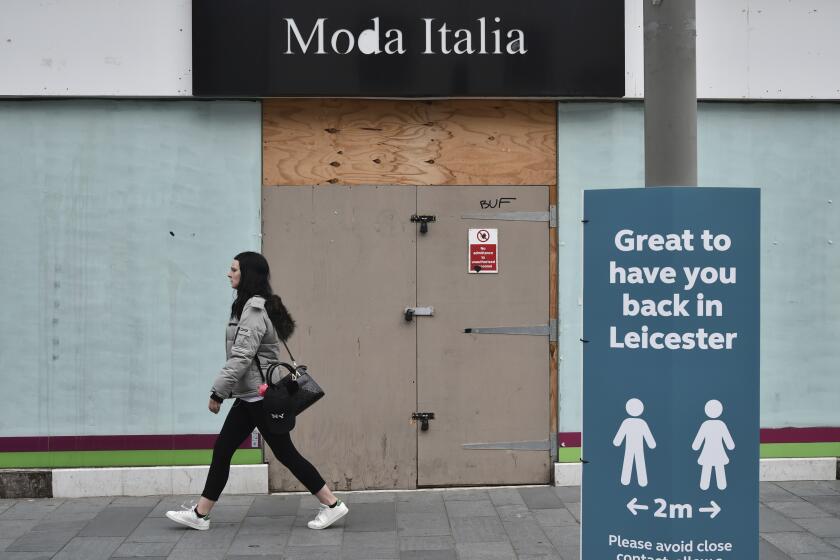British economy nosedives 20% in worst coronavirus-induced recession among Group of 7

- Share via
LONDON — Britain has suffered the deepest recession among the world’s top economies this year, shrinking by a fifth in the second quarter alone when much of the economy was mothballed as part of efforts to contain the COVID-19 pandemic.
The 20.4% quarterly drop is the worst since records began in 1955, the Office for National Statistics said, and means that Britain is officially in recession.
While many of the lockdown restrictions have since been eased, the country faces a tough time in the coming months, with unemployment likely to spike as the government phases out a support program that has helped keep nearly 10 million workers on company payrolls.
Britain’s recession is deeper than those recorded by comparable economies in Europe, notably Germany, France and Italy, or by the United States. Canada and Japan, the remaining members of the Group of Seven leading industrial nations, have yet to publish their second-quarter numbers, but no economist thinks they will be as bad as Britain’s
Kallum Pickering, senior economist at Berenberg Bank, said the main reason why the British economy has fared worse is that the lockdown was introduced at “a later stage” in the coronavirus outbreak, particularly when compared to other European countries.
By the time Prime Minister Boris Johnson introduced the lockdown March 23, Britain was experiencing a bigger first wave of infections and deaths than might have otherwise been the case, Pickering said, meaning that restrictions had to last longer. Shops in Germany, for example, reopened May 6, compared with June 15 in Britain.
U.K. Prime Minister Boris Johnson made financial pledges on schools, housing and infrastructure amid a coronavirus crisis with a death toll of 43,000.
The U.K. also has the highest official coronavirus death toll in Europe, with 46,611 deaths, though the actual toll is believed to be higher because the official data set does not include people who may have died from COVID-19 before they could be tested.
There is some hope that the economy is healing as lockdown restrictions are eased.
“The economy began to bounce back in June with shops reopening, factories beginning to ramp up production and house-building continuing to recover,” said statistician Jonathan Athow.
The British government hopes the economy will be helped by further measures such as the reopening of pubs and restaurants and a recommendation for office workers to return to their workplaces, provided those spaces are deemed COVID-safe.
While the rest of England gingerly reopens, the city of Leicester has gone back into lockdown because of a troubling coronavirus infection rate.
However, Samuel Tombs, a senior economist at Pantheon Macroeconomics, thinks the British economy will likely lag others because of “structural disadvantages,” notably the fact that the economy is so dependent on consumer-facing businesses, where human interactions are more important than in manufacturing or construction.
And it’s almost inevitable that unemployment will skyrocket, potentially more than doubling to the 3-million mark last seen in the 1980s.
“I’ve said before that hard times were ahead, and today’s figures confirm that hard times are here,” said Chancellor of the Exchequer Rishi Sunak. “Hundreds of thousands of people have already lost their jobs, and sadly, in the coming months, many more will.”
So far, the British government has kept a lid on the official unemployment numbers through its Coronavirus Job Retention Scheme, which has allowed hard-pressed firms to retain workers rather than fire them. Under the program, the government has been paying a large chunk of the salaries of workers kept on payroll. Some 1.2 million employers have taken advantage of the program to furlough 9.6 million people at a cost to the government of $44 billion.
After much wrangling, EU leaders approve a coronavirus recovery fund. Can the U.S. also find a compromise?
Sunak is ending the program in October but insists “nobody will be left without hope or opportunity.”
Many Britons, including union leaders and opposition lawmakers, are urging him to extend the program to sectors still suffering from restrictions.
“The best way to get our economy back on its feet is to keep people in work,” said Frances O’Grady, general secretary at the Trades Union Congress, an umbrella labor group.
The British economy faces other head winds besides the pandemic, particularly the uncertainty over its future trading relationship with the European Union following Britain’s departure from the bloc in January.
Britain is currently in a transition period whereby it remains part of the EU’s tariff-free arrangements until the end of the year. The future economic relationship has yet to be agreed upon, meaning that tariffs could be imposed on traded goods between the two sides at the start of next year — a development that most economists think would further hobble an economy struggling to recover from the pandemic.
More to Read
Sign up for Essential California
The most important California stories and recommendations in your inbox every morning.
You may occasionally receive promotional content from the Los Angeles Times.
















